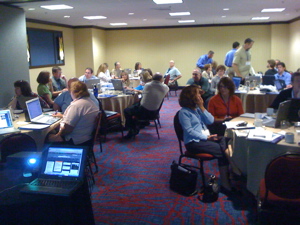During the 1st day of Mark and Brent’s Collaboration summer seminar, they got folks active: starting blogs, wikis, webtops, etc. They’re doing a great job:
Naturally, in addition to the tactical questions (“how do I move this tab”?), the conceptual questions started: when do you use a blog versus a wiki, how do you make sense of all the options out there.
Now, as part of my performance ecosystem, I think blogs are a personal reflection or a history (as I told an attendee, it would be great for capturing a ‘war story’), whereas wikis are for collaboration to create a unified view of something (e.g. the way to tune a network). I don’t think blogs support a rich discussion and aren’t that collaborative. Also, one of the problems I see is that we often forget old tools in the excitement of new tools: discussion boards are a great way to have an ongoing conversation; you don’t need some new tool for this. Yet wikis are really good for capturing the output of a collaboration.
Also recently I’ve been having conversations with folks about integrating tools to meet larger needs. Ning is a tool that provides ways for individuals to have profiles, to have forums, to list events, etc. Increasingly, LMSs also have these capabilities.
The interesting thing is the great spate of tools out there: Google, Central Desktop, Zoho, Wetpaint, PBWiki, an ever growing list. There are suites of web meeting apps, web-based productivity tools, etc. How do you make sense of it? I think there’s another ‘bubble’ with these, and eventually a bunch will fail and out of the ashes a few will persist. The good thing, I think, is that by getting your hands dirty with a variety of these, you’ll access some generalized skills. And web apps are not going away.
I believe training anybody on any particular tool (even the seemingly ubiquitous Microsoft Office suite), is the wrong way to go. Talk to them about the skill (writing, creating presentations, etc), and then give some assignments across a couple of different tools. This gives you transferrable skills, which will equip you to communicate and collaborate regardless of the latest wave of tools. And that’s what’s important, in this day of increasing change.

